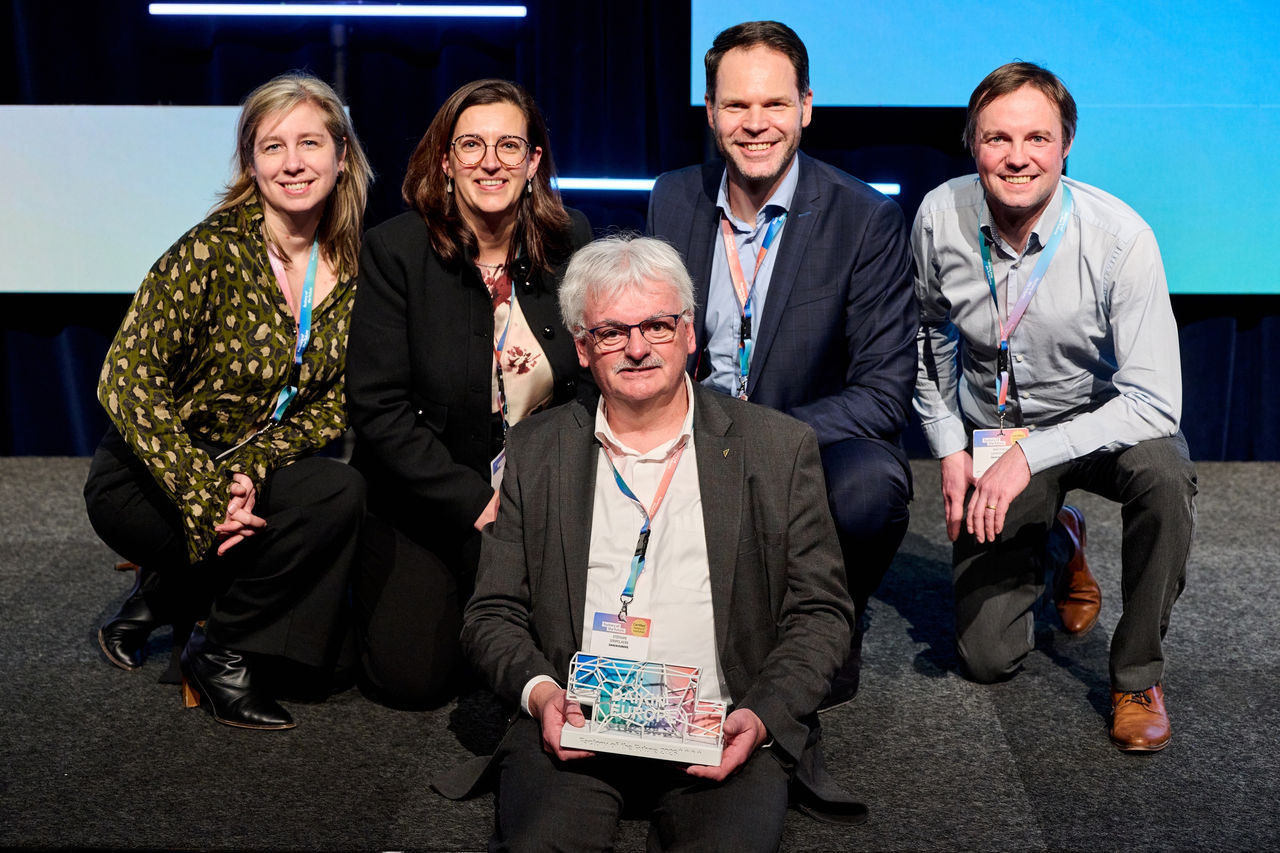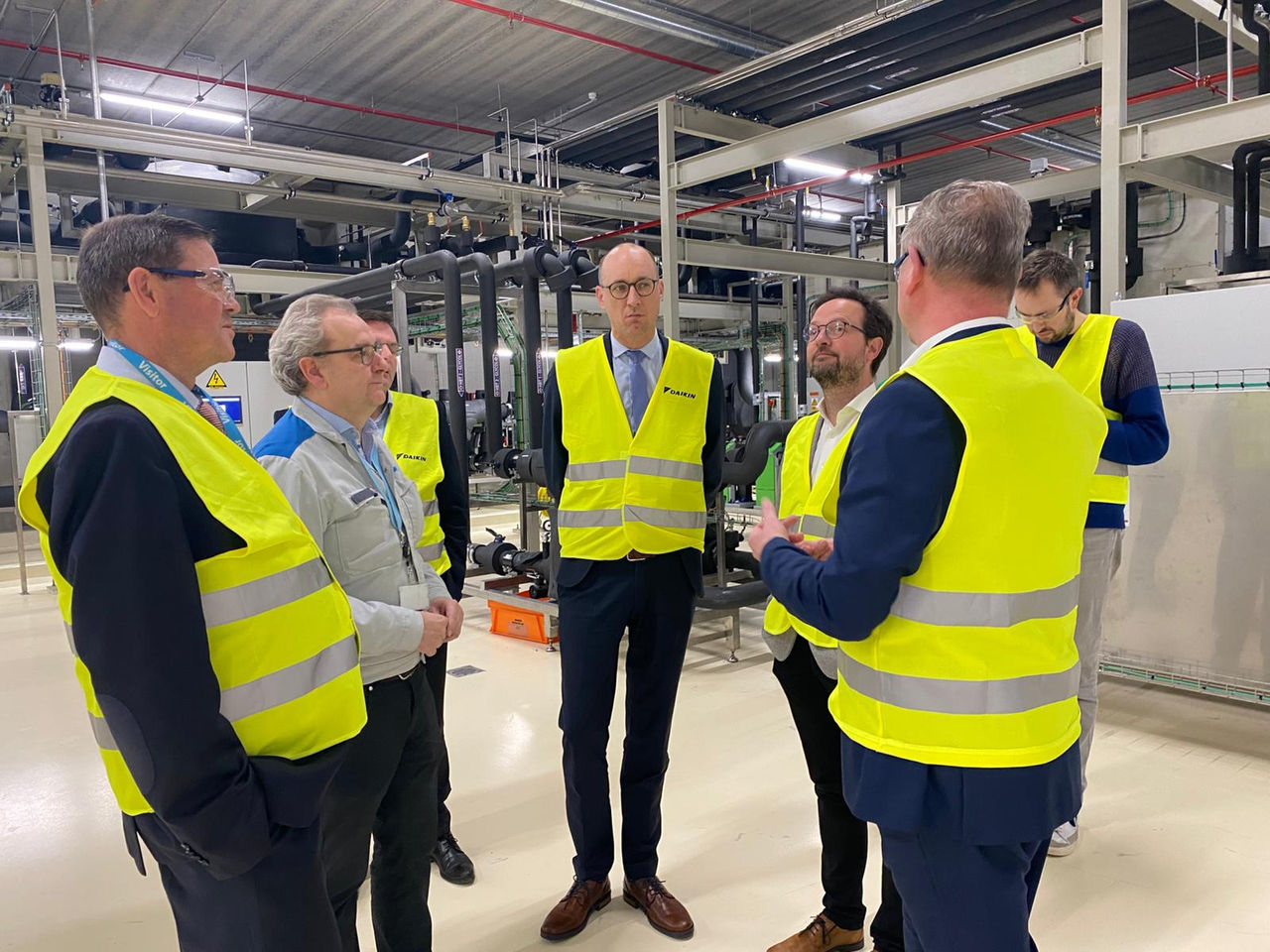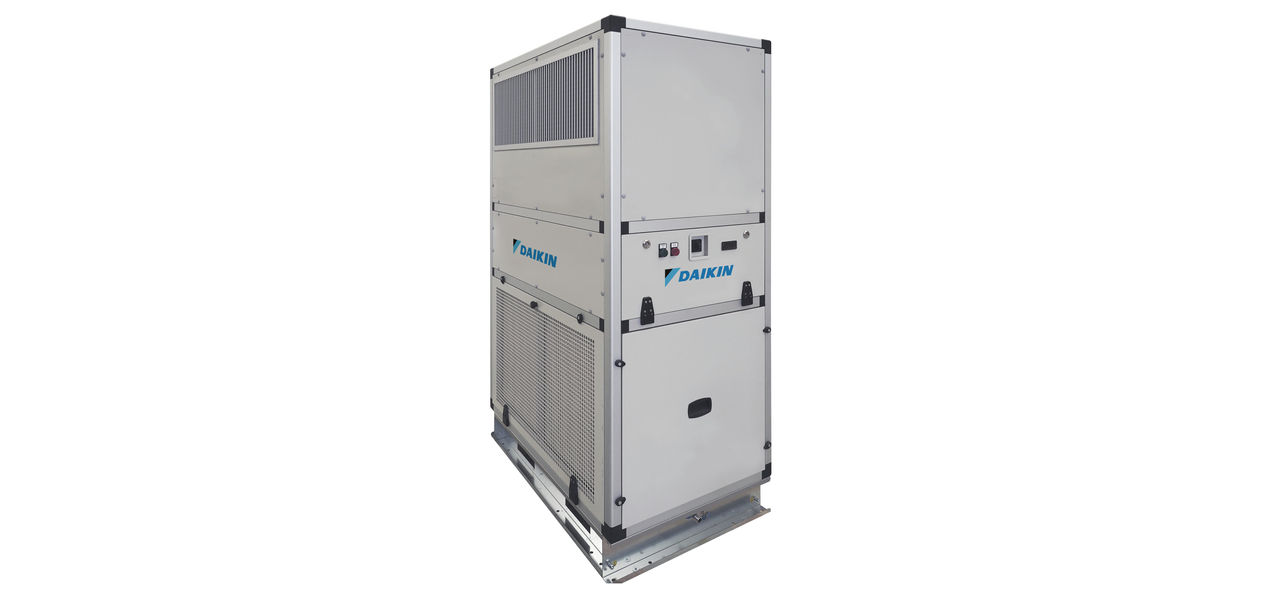
Brussels, October 2nd 2023 – Daikin Europe has unveiled the results of its research project Natural HVACR 4 LIFE. Co-funded by the European Union’s LIFE programme, the project explored the use of CO2 as refrigerant in an integrated refrigeration, comfort cooling and heating solution (HVAC-R) with thermal storage. Next to the Life Cycle Climate Performance (LCCP), other aspects of CO2 as refrigerant were explored to understand opportunities and barriers for the technology to take root.
EU HVACR 4 LIFE Research project
The 5+ million euro research project which ran from 2019 to 2023, and was co-funded by the EU’s LIFE programme and led by a team of research engineers at Daikin Europe N.V.
The research studied the performance of a prototype CO2 Conveni-pack system with thermal storage. Amongst others, the project developed an optimised indoor air distribution cassette for the system with CO2 refrigerant and tested the thermal storage system’s performance under different climate conditions. To this end, the systems were installed and studied in the field. Installation, operation and monitoring of CO2 prototype systems was done on selected supermarket locations across Europe (in Germany, France, Spain, Czech Republic and Belgium). The research also mapped the LCCP of integrated HVAC-R systems using CO2 as refrigerant versus systems with R-410A.
An adapted prototype of Conveni-pack with CO2 refrigerant
The Daikin Conveni-pack is an existing integrated HVAC-R system for food retailers that combines refrigeration, comfort cooling and heating in a preassembled solution. It recovers heat from the refrigeration display cabinets and reuses this heat for space heating at no extra cost. In this way, around 38% of the annual space heating demand for a typical supermarket can be reclaimed. This makes the Conveni-pack highly energy efficient compared to non-integrated solutions.
For the project, the team developed an adapted version of the CO2 Conveni-pack, able to connect with a thermal energy storage module. The team also researched and developed an economically viable cassette indoor unit to go with the system. This allowed to optimise the application of a CO2 Conveni-pack system.
Results of the project research
Desk research into the life cycle direct and indirect emissions of both type of systems, either using CO2 (GWP of 1)1 or R-410A (GWP of 2088)1, revealed better LCCP performance for the integrated system that uses CO2 as refrigerant: 21% lower life cycle emissions during a 10-year life cycle versus the same system with R-410A refrigerant.
However, observations of CO2 systems installed on various locations show that several hurdles remain to be tackled in terms of cost efficiency, installation footprint (size) and energy efficiency.
“We compared the life cycle climate performance of the CO2 Conveni-pack to the R-410A model. According to our analysis, the system with CO2 as refrigerant outperforms the same system equipped with R-410A with 21% lower life cycle emissions over a lifetime of 10 years. The Global Warming Potential of the refrigerant was the major differentiator”, explains Nishant Karve, Environmental Research Engineer at Daikin Europe, and part of the LIFE project research team.
“The CO2 emissions linked to the materials used in the units are higher for the CO2 unit, since the unit is twice the size as the R-410A one. Also, the CO2 unit consumes more energy compared to the R-410A unit. This because of the high pressures used and extra safety measures for the CO2 unit. But in terms of LCCP these aspects are surpassed by the impact of the GWP of the refrigerant,’ concludes Nishant.
Selection of type of system depends on the needs per application
Because of the differences in performance on distinct aspects, Daikin commercialises both R-410A and CO2 systems with varying specifications, meeting specific customer needs. Both systems can cover the requirements for refrigeration, comfort cooling and heating of supermarkets and other food retailers.
On the aspect of energy efficiency and product footprint the R-410A unit performs notably better than the CO2 unit, as it proves 13% more energy efficient than the Conveni-pack with CO2. It is also more compact than the CO2 unit, with which is twice as large as the R-410A unit for the same rated capacity output, a crucial factor in case installation space is limited.
Given that the CO2 unit consumes more electricity, the carbon intensity of the electricity used on site during the operation of the unit plays a role in the final assessment of the LCCP. This is particularly important in regions with hot summers, as higher temperatures correlate with a decrease in energy efficiency of the CO2 units.
“Based on what our clients need in terms of refrigeration and space heating or cooling, Daikin-trained installers always recommend the best solution for a particular store or application. In some cases that will be CO2, in other cases they might be served better by an energy-efficient heat pump and cooling system with an alternative refrigerant and advanced controls,” says Junji Umamoto, Vice-President Cold Chain at Daikin Europe.
“As market leader we continuously aim to do better and bring to market solutions that allow our customers to reduce their energy costs, as well as their carbon footprint. We are grateful to have been part of this EU Life project. It clearly highlighted the benefits of CO2 as a natural refrigerant in integrated HVAC-R systems,” concludes Junji Umamoto.

Nishant Karve

Junji Umamoto
Daikin’s environmental vision
Daikin Europe led the Natural HVACR 4 LIFE research project, in line with its global environmental vision to reduce its carbon emissions, including the emissions generated throughout the total life cycle of its products and solutions, to net zero by 2050.
Using a diverse range of refrigerants and continuously exploring ways to provide the best balance refrigerant properties of GWP, safety, energy efficiency and affordability is an integral part of Daikin's refrigerant policy. Daikin supports the goals of the Montreal Protocol-Kigali amendment and the EU F-gas regulation to phase down the consumption of HFCs.
Further information
- Website Natural HVACR 4 LIFE: www.naturalhvacr4life.eu
- Full research report and research materials available for download: https://www.naturalhvacr4life.eu/brochures-and-youtube/
- Daikin’s Refrigerant Policy: https://www.daikin.com/csr/information/influence
- The EU LIFE programme is the EU’s funding instrument for environment and climate action. More info on EU LIFE can be found here: https://cinea.ec.europa.eu/programmes/life_en
1 Intergovernmental Panel on Climate Change, "Fourth Assessment Report," IPCC, 2007 - link to Global Warming Potential coefficients: https://unfccc.int/process-and-meetings/transparency-and-reporting/greenhouse-gas-data/frequently-asked-questions/global-warming-potentials-ipcc-fourth-assessment-report
About Daikin
Daikin Europe N.V.
Daikin Europe N.V. is a subsidiary of the global group Daikin Industries, and the leading provider of heating, cooling, ventilation, air purification and refrigeration (HVAC&R) technology in Europe, Middle East and Africa. Daikin designs, manufactures, and brings to market a broad portfolio of products, maintenance services as well as turnkey solutions for residential, commercial, and industrial purposes. To date Daikin Europe has over 13,700 employees across more than 57 consolidated subsidiaries. It has 14 manufacturing facilities based in Belgium, the Czech Republic, Germany, Italy, Spain, Austria, the United Kingdom, Turkey, the United Arab Emirates, and the Kingdom of Saudi Arabia. The headquarters of the Daikin Europe group are in Ostend, Belgium. The company was established in 1972, production in Europe started in 1973.
About Daikin Industries Ltd.
Daikin Industries was founded in 1924, in Osaka, Japan. The global group employs over 96,000 people worldwide and is the market leader for heat pump and air conditioning systems, as well as air filtration. It is the only manufacturer in the world that develops and manufactures heating, ventilation, air conditioning and refrigeration equipment, as well as refrigerants in-house. The company achieved € 28.2 billion sales turnover in fiscal year 2022 (1 April 2022 – 31 March 2023).
Read more on www.daikin.eu and www.daikin.com.
Media Contacts Daikin Europe N.V.
Sofie Sap – T.: +32 472 580482 Mail: sap.s@daikineurope.com
Daisuke Kakinaga – T.: +32 465 462321 Mail: kakinaga.d@bxl.daikineurope.com



